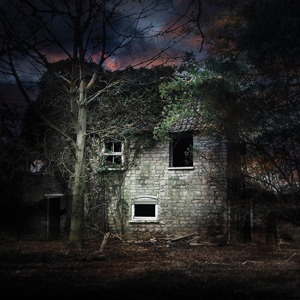Are spirits, slayings or slurs 'material defects' homebuyers must be told of?

Photo illustration by Jeff Dionise.
Understandably, every homebuyer wants to know as much as possible about a prospective residence. New roof? Check. Hardwood floors? Check. No liens or taxes owed? Check and check. No detail is too small to be ignored: Buyers have questions and, by golly, they want answers.
That means real estate agents sometimes have to walk a fine line between full disclosure and overdisclosure. Yes, you need to tell a buyer about the crack in the basement wall; and yes, you need to discuss the termite damage. But is it necessary to come clean about bad vibes?
Real estate agents have long had to deal with perceived “psychologically impacted”—OK, haunted—properties, and, as one might expect, the disclosure requirements vary greatly from state to state, according to a 2011 Mental Floss article.
In Massachusetts, agents need not consider a suspected otherworldly presence to be a “material fact required to be disclosed” to a potential buyer. In other words, if you don’t ask, they don’t have to tell. In Virginia, paranormal disclosure need only be made when there is a physical manifestation: Is that blood running down the wall? Guess we’d better say something. And in California, disclosure of a death in the home must be made only if it occurred within the previous three years, Mental Floss reported.
The Pennsylvania Supreme Court weighed in on the topic in July when it ruled in Milliken v. Jacono (PDF), a case involving the sale of a home in which a man killed his wife and himself in 2006. Kathleen and Joseph Jacono bought the house at auction and sold it in 2007 to Janet Milliken, saying nothing about the murder/suicide. Milliken sued the Jaconos and their agents for nondisclosure and misrepresentation.
A trial court had granted the Jaconos’ motion for summary judgment in 2011, ruling that they had no legal obligation to disclose the grisly crime to Milliken, who appealed. The Pennsylvania high court upheld a lower court’s ruling that real estate agents have no duty to disclose that a property is afflicted with a “psychological stigma,” adding that “we are not ready to accept that such constitutes a material defect.”
The court also noted that “the varieties of traumatizing events that could occur on a property are endless,” so a comprehensive legal duty to disclose them all could theoretically include home invasions, satanic rituals or a bad hair day. (OK, the court didn’t really mention that last one.)
Earlier this year, according to the Daily Mail, a New Jersey woman stretched the concept of misrepresentation a bit by suing for nondisclosure—of the fact that her new home in Mays Landing was haunted by the presence of a problem neighbor. Cyndee Phoenix bought the property in October last year, and it reportedly didn’t take long for across-the-street neighbor Kevin Potter to harass and intimidate her family on a regular basis with “snide and racist” comments and actions, according to Courthouse News Service.
The January lawsuit reportedly claims that real estate developer Lennar Corp. knowingly concealed that a “dangerous individual” lived nearby, and alleges material misrepresentation, omission and fraud. As of late October, the parties were waiting for a judge’s ruling on Lennar’s motion to dismiss.
So it looks like real estate agents, having had to contend with the specter of horrors both real and imagined, should thank the Pennsylvania Supreme Court for making their jobs a little less scary.




